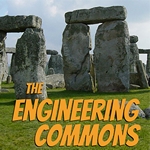Careers in Engineering
A career in engineering can propel you to the forefront of innovation, where you'll contribute to groundbreaking advancements in technology and infrastructure. Whether you're drawn to the intricacies of software design, the power of electrical systems, or the mechanics of physical structures, engineering offers a diverse range of exciting opportunities.
Consider exploring these specialized fields through the degree programs offered at Embry-Riddle:
- Aerospace Engineering: Design, develop, and test aircraft, spacecraft, and propulsion systems, pushing the boundaries of technology and engineering.
- Computer Engineering: Combine electrical engineering and computer science to design and develop computer hardware and software systems.
- Electrical Engineering: Design and develop electrical systems, from power generation and transmission to electronic circuits and devices.
- Mechanical Engineering: Apply principles of physics and materials science to design, analyze, manufacture, and maintain mechanical systems.
- Software Engineering: Design, develop, and test software applications, from mobile apps to complex enterprise systems.
To excel in these fields, you'll need a strong foundation in mathematics, physics, and engineering principles. Additionally, developing strong problem-solving, critical thinking, and teamwork skills will be crucial.
Explore this guide to learn more about the specific steps you can take to achieve your career goals. Schedule a meeting with a Career Advisor to get information tailored to your previous work experience and aspirations.
Recommended Job Boards
- EngineeringJobs.Net Job SearchJob site designed to connect employers and engineers in all the different engineering fields.
- IEEE Job SiteInstitute of Electrical and Electronics Engineers' (IEEE) job board for engineering, computing, and technology professionals.
- ASME Career CenterAmerican Society of Mechanical Engineers (ASME)'s job board for Mechanical Engineers.
- AIAA Career CenterAmerican Institute of Aeronautics and Astronautics (AIAA)'s career webpage that provides job seekers with industry openings in aerospace and aeronautics.
Books about Careers in Engineering
Resumes for Engineering Careers by
Call Number: TA157.R479 2005ISBN: 9780071448901Publication Date: 2005-09-01Understanding the Educational and Career Pathways of Engineers by
Call Number: eBookISBN: 9780309485609Publication Date: 2019-01-26Exploring Careers in Engineering by
Call Number: TA157.D64 2023ISBN: 9781678203320Publication Date: 2022-08-01
Podcasts about Engineering
- The Engineering Commons
 Practical insights for engineers by engineers.
Practical insights for engineers by engineers.
Specific Application Requirements for Engineering
When applying for engineering positions, be prepared for specific requirements that may differ from traditional job applications. Jobs in engineering focus on:
Technical Skills and Certifications
- Programming Languages
- Proficiency in languages like Python, C++, Java, or MATLAB is often required.
- Computer-Aided Design (CAD) Software
- Experience with CAD software like SolidWorks, AutoCAD, or CATIA is essential for many mechanical and aerospace engineering roles.
- (Optional) Industry Certifications
- Certifications such as Professional Engineer (PE) or Certified Computing Professional (CCP) can enhance your candidacy.
Project Experience
- Personal Projects
- Showcase your skills and creativity through personal projects like building robots, drones, or software applications.
- Internships and Work Experiences
Portfolio
- A portfolio can showcase your design work, code, or engineering projects.
Interview Preparation
- Technical Interviews
- Be prepared to answer technical questions about algorithms, data structures, or engineering principles.
- Behavioral Interviews
- Practice answering questions about your past experiences and problem-solving skills.
- Case Interviews
- Some companies, especially consulting firms, may use case interviews to assess your analytical and problem-solving abilities.
Pathways Programs for Engineering
The Center of Career & Professional Development works with engineer-related companies to provide internship and job opportunities for students. To get specific information related to your past experiences and work history, schedule an appointment with a Career Advisor. Pathways program opportunities will be announced by the Center for Career & Professional development upon availability, and it is highly recommended to create a Handshake account to stay up to date on current information available.
What to Expect While Applying
The application process for engineering positions can vary depending on the specific role, company size, and industry. However, here's a general timeline:
- Application Submission
- This can be through online portals, job boards, or direct company websites.
- Initial Screening
- HR or hiring managers review applications, often using applicant tracking systems (ATS).
- Technical Assessment
- This may involve coding challenges, design problems, or technical quizzes.
- Phone or Video Interview
- A preliminary interview to assess basic qualifications and cultural fit.
- On-Site Interview
- Multiple rounds of interviews, including technical and behavioral interviews.
- Offer and Negotiation
- If selected, you'll receive a job offer, which may involve salary and benefits negotiations.
What Employers are Looking For:
- Technical Assessments
- Engineering roles often involve rigorous technical assessments, such as coding challenges, design problems, or simulations.
- Specialized Skills
- Proficiency in specific software tools, programming languages, and engineering principles is crucial.
- Teamwork and Collaboration
- Many engineering projects involve teamwork, so strong communication and collaboration skills are essential.
Tips for the Interview Process
- Prepare for Technical Questions
- Be ready to discuss algorithms, data structures, engineering principles, and specific projects.
- Practice Behavioral Interview Questions
- Prepare to discuss your past experiences, accomplishments, and challenges.
- Ask Thoughtful Questions
- Prepare questions to ask the interviewer, such as about the team, the project, or the company culture.
Still Feel Lost? Contact a Career Development Advisor!

Make an appointment on Handshake
Call the Center for Career & Professional Development
(928-777-6600)
Email a Career Development Advisor
